The letters I.L.W.U. stand for International Longshore and Warehouse Union, a union created in 1934 when longshore and
warehouse workers on the West Coast of the United States merged to form a single union. In 1937, longshore workers in Ha-
waii chose to join up with the ILWU, because it was a democratic union that stood for racial equality within its membership.
This was important to the Hawaii members who were mostly of Hawaiian and Asian ancestry.
Within a few years, tens of thousands of sugar and pineapple workers also joined the ILWU, attracted by the union’s program
of uniting all ethnic groups and its reputation as a democratic union run by the membership. Before the ILWU, unions in
Hawaii organized workers along craft or ethnic lines. This divided the working class, and such unions were no match against the powerful employer group that controlled the islands.
With the ILWU, workers finally had an organization with the strength and solidarity that could match the power of the employers. ILWU members won job security and improvements in wages and benefits. With their jobs protected, ILWU members registered to vote, got involved in community affairs, and elected candidates who would work for legislation to benefit working people. This opened the way for Hawaii to develop into a progressive, democratic society.
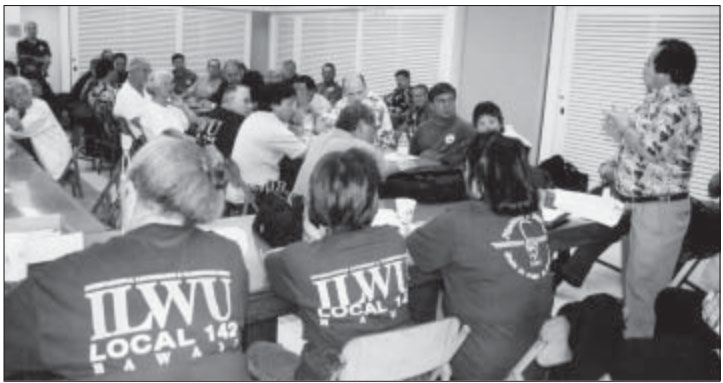
ILWU members and pensioners meet before going over to the State Legislature for its opening day. A strong presence at the legislature is just part of the ILWU’s political action program, which includes voter registration and education, member mobilization to “get out the vote,” and support for labor-friendly candidates.
What is Local 142?
Local 142 is the one of 60 separate unions which make up the ILWU. These local unions are located in California, Oregon, Washington, Alaska, Canada, and Hawaii. Most of these locals were part of the ILWU since the 1930s and share the same
principles of a democratic union run by the membership. Each local union could operate on its own, but has chosen to be part of the ILWU.
Each local contributes money to run the overall ILWU organization, which is called the International ILWU or just International. The headquarters of the International is located in San Francisco, California.
Local 142 is based only in Hawaii. We have our own officers, constitution, and structure. Our headquarters are located in Honolulu at 451 Atkinson Drive. Local 142 is made up of four divisions based on the four counties of Hawaii, Maui, Kauai, and Oahu.
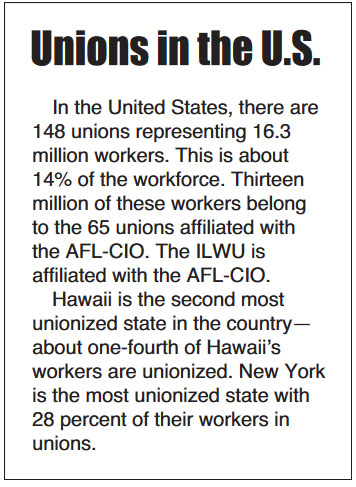
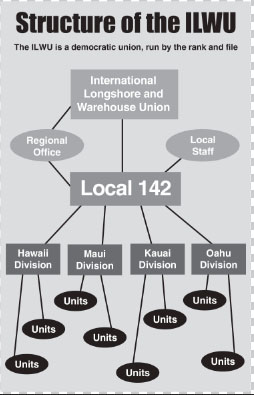
A Guide to the ILWU
What every member should know
Welcome to the ILWU! As a member of ILWU Local 142, you are part of a long and proud tradition where workers join or form organizations for their mutual benefit and to promote fairness and justice on the job. These organizations are called labor unions,trade unions, or just unions.
In Hawaii, one out of every four workers are members of a labor union. The most common ind of union is based on the job the worker does. For example, there are unions of airline pilots, firefighters, bricklayers, teachers, and nurses, and only workers who do those jobs are members of those unions. Another kind of union is based on an entire industry— such as hotel workers, government employees, or postal workers. A third kind of union, like the ILWU, organizes and includes workers from many different industries. This kind of unionism brings the highest level of unity to workers.
There are 22,000 ILWU members on all major islands in Hawaii, which makes the ILWU one of the largest unions in Hawaii. ILWU members work in every major industry including: tourism, long shore, sugar, pineapple, manufacturing, transportation, and hospitals. ILWU members hold diverse jobs—they include mechanics, drivers, cooks, hotel housekeepers, store cashiers, computer clerks, hospital technicians, and more.
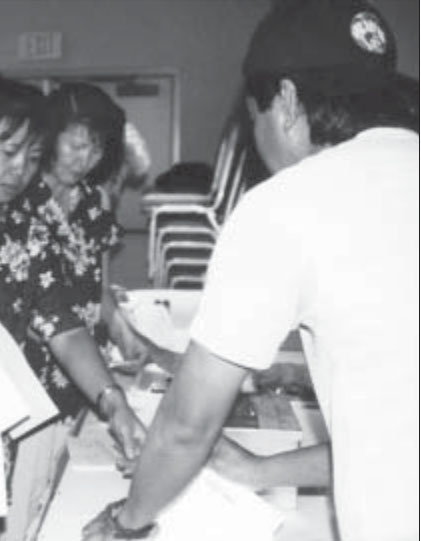
Participation in your union builds the ILWU and is necessary for the union to succeed. (Above) Honolulu Airport Hotel workers take the time to attend a contract ratification meeting and to vote on whether or not to accept their tentative contract. Voting on your contract is just one way to participate in theILWU—see the article at right for others.
You have rights on the job
As a member of a union, you have rights on the job. With the ILWU you have the combined strength and experience of the union on your side.
You have the right to have a union steward or business agent help you with any problem on the job. You have the right to ask for a union representative if the company calls you into a meeting which may lead to disciplinary action.
You put yourself at a disadvantage when you try to settle a problem by yourself, or when you fail to let your union know of problems you and your fellow workers have.
If you have a question or problem on the job, the first thing you should do is talk to your on-the-job union steward.
Your company is called a “unit” within the ILWU structure. Each unit has its own elected officers and union stewards, who serve as volunteers. They get no special treatment or privileges from the company or from the union, but they are ready to help you and your fellow workers.
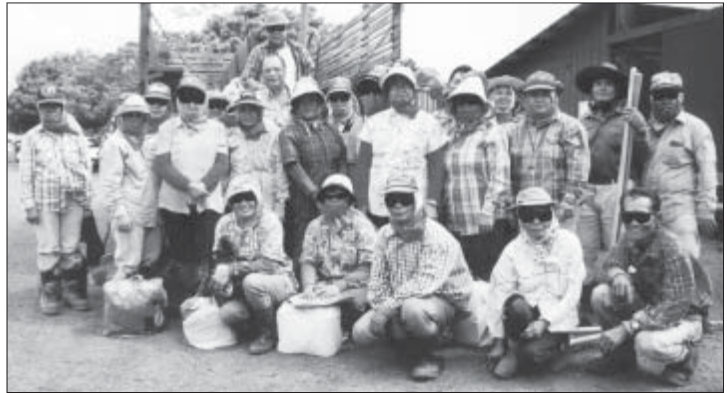
Like all ILWU members, these sugar workers from Hawaiian Commercial & Sugar Company have rights on the job. Union members often enjoy many rights and benefits beyond what is required by law—all because of the union contract.
Your duties as a member
Article I of the Constitution and Bylaws of ILWU Local 142 describe the duties and responsibilities of membership. Following are excerpts from the Constitution that contain some of the more important duties of membership:
1.08. Every member shall conform to and abide by all rules concerning wages, hours and working rules as agreed to by the Local and pay Local, Division, and unit dues and assessment in amounts set in Section 25.02 of the Constitution, and as deter-
mined by the applicable Division and unit. The obligations of membership as set forth in the Constitution shall constitute a binding contract between the union and the member and shall be enforceable in a court of law by the union.
1.09. It is the duty of all members to serve the Local when called upon, to respect lawful picket lines, engage in work stoppages and other lawful concerted actions, and abide by the Constitution, Bylaws, and all rules and policies established by the Local. No member shall bring frivolous charges, challenges, or claims against the union and no members shall present frivolous defenses to charges, challenges, or claims brought against the member by the Local. Charges or defenses without
constitutional, legal, or factual basis may incur attorney fees, costs and other expenses which shall be chargeable to the member.
1.10. Every member must furnish the Local with their correct home address and notify the Local of any change. Notice sent by ordinary mail to the last address given shall be conclusively deemed official notice.
1.11. It shall further be the duty of each member to attend meetings, vote in all elections and read the official publication of the Local.
Get involved in your union
Know your rights. Read and understand your rights and benefits under the union contract and the ILWU Constitution. You can get copies from your union representative. Take an active part in shaping your working life. Get to know your union stewards and get involved with union activities. The union is only as strong as its members.
Come to union meetings. You’ll learn about your rights as a working person. It’s an education that will make you a better person and your employment at your company more rewarding and enjoyable. Your participation in the union is always welcome and you will be glad you got involved. Meeting notices are posted on the union bulletin board, along with other important announcements. Make it a practice to regularly read the notices on the union bulletin board.
